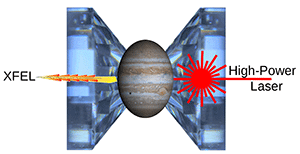Purpose and Goals
The generation and diagnostics of extreme states of matter prevailing in the interior of planets, brown dwarfs and stars is a key scientific challenge in a number of scientific fields.
These include:
- Generation of such conditions at FLASH and free electron laser facilities (e.g., European XFEL).
- Generation of higher pressures in static experiments both in the laboratory and at synchrotron facilities (PETRA III).
- Development of new diagnostic tools.
- Predictions of high pressure and temperature properties of materials from ab-initio methods.
To bring together researchers from these different fields in the physical sciences, a workshop series has been established by DESY, XFEL GmbH, DLR Berlin, the University of Rostock and Bayerisches Geoinstitut to discuss related topics and problems. The aim of the upcoming workshop is to continue the discussion of scientific questions with relevance for extreme planetary environments at high pressures and high temperatures. Such conditions are prevalent in the deep interiors or in the atmospheric envelopes of planets and satellites of our solar system as well as of other star systems.
The following topics will be part of the workshop:
- Dynamic and ultrafast processes in strongly excited matter
- Compression experiments using high-power optical and free electron lasers
- Laboratory experiments using multi-anvil and diamond-anvil cells
- Ab-initio simulation studies for matter under extreme conditions
- Equations of state, petrology, and chemistry of planetary materials
- Melting and phase relations of materials at extreme conditions
- Evolution and structure of giant planet interiors
- Structure, composition, and internal dynamics of solid planets
- Physics and chemistry of impact processes
The workshop will include a mix of solicited, contributed and poster presentations. This meeting is also intended to inspire new projects and offer a discussion space to foster collaboration between workshop participants from the various research fields.
Invited Speakers
- Elena Bykova, Bayerisches Geoinstitut, University of Bayreuth (Germany)
- Richard G. Kraus, Lawrence Livermore National Laboratory (USA)
- Kaustubh Hakim, University of Bern (Switzerland)
- Kristine Lam, DLR Berlin (Germany)
- Tim Lichtenberg, University of Oxford (UK)
- Vitali Prakapenka, The University of Chicago (USA)
- Allona Vazan, The Open University of Israel
Time and Location
The workshop will start on September 28th (noon) and end on September 30th (noon) 2022. It will be held in Brussels at the Royal Observatory of Belgium. The deadline for abstract submission is September 5, 2022. There is no registration fee.
There are no close-by hotels to the observatory, but it can be reached easily by public transport, either by bus directly to the observatory (https://www.stib-mivb.be/tripplanner/?l=en) or by train to the St. Job station (https://www.belgiantrain.be/en), 5 minutes walk from the Observatory.
In case of questions please contact the local organizing committee, Attilio Rivoldini and Tim Van Hoolst or the program chair, Gerd Steinle-Neumann.

